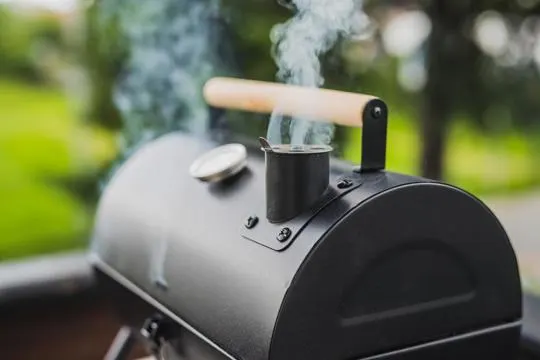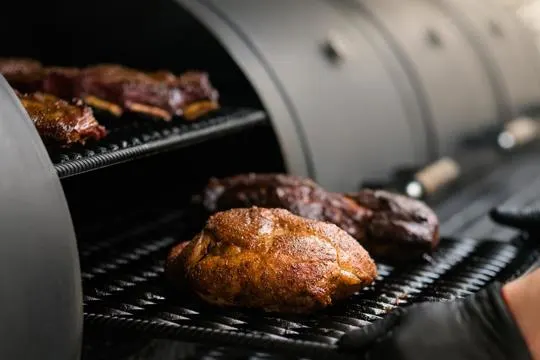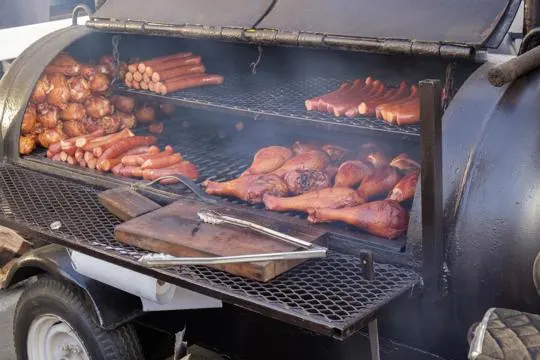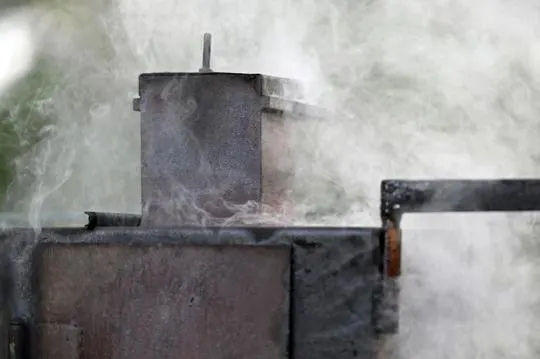In the great debate of charcoal vs wood smokers, we’re all after that perfect smoked flavor. Charcoal gives a consistent heat. Wood, on the other hand, adds a unique taste.
Ever tried smoking your own brisket? We did. It was a weekend project. The results? Surprising, and deliciously smoky.
Using charcoal felt like having a cheat code for temperature control. Easy to manage, yet does it compare to the complexity wood brings? That’s the million-dollar question.
Some say wood-smoked is the holy grail of barbecue. We think there’s truth there. The variety of wood chips – apple, hickory, mesquite – it’s like picking your magic potion.
What’s your go-to? We’d love to hear your tales of smoke and fire.
What is a Charcoal Smoker?

Charcoal smokers are an essential culinary tool.
They are designed to give food a smoky flavor.
The smoker is made up of a cylindrical body, a lid, a cooking rack, and a firebox.
Heat from burning charcoal creates a low and steady temperature inside.
This slow-cooking method is perfect for grilling, smoking, and barbecuing.
Plus, charcoal smokers are versatile.
They can be used for hot smoking and cold smoking.
Hot smoking is done at temperatures between 200°F and 250°F.
Cold smoking involves exposing the food to smoke without heat.
You can make anything from ribs to salmon.
Charcoal smokers come in all sorts of shapes and sizes.
From portable models for picnics to larger ones for professional kitchens.
Some come with features like adjustable air vents and water pans.
What is a Wood Smoker?

A wood smoker is a cooking tool that uses wood to heat and flavor food.
It adds a smoky taste to dishes by slowly infusing them with the aroma of different types of wood.
This is done by placing the wood in a chamber or tray, producing smoke which envelops the ingredients.
Using a wood smoker can bring out unique flavors in meats and vegetables.
Different types of wood add their own flavor, such as hickory for a strong taste, applewood for a sweet aroma, or mesquite for an earthy flavor.
The wood smoker gives control over the cooking process.
Chefs can adjust temperature and airflow to fine-tune the amount and intensity of smoke.
This allows for experimentation with different techniques, creating delicious smoked dishes.
Differences Between Charcoal and Wood Smokers

Fuel Source
Smokers require a fuel source to cook.
Charcoal and wood are two popular options.
Charcoal is made from partially burned wood and provides consistent heat and flavor.
Wood logs, on the other hand, give a more authentic and robust smoky flavor.
Charcoal is convenient and accessible.
Yet, wood offers different flavors depending on the type of wood used.
The choice between charcoal and wood depends on personal preference.
Both can deliver delicious results when used properly.
Flavor Profile
Charcoal and wood smokers bring very different flavor profiles.
Charcoal produces a smoky, classic BBQ taste.
The briquettes give off a sweet smell and flavor.
Wood smoking, however, is more complex.
Different hardwoods like hickory, mesquite, apple, or cherry, all add unique aromas and tastes.
The choice of charcoal or wood is a personal preference.
Some prefer the smoky flavor of charcoal while others like to experiment with wood for new flavors.
Both methods give delicious results sure to please all tastebuds.
Temperature Control
Charcoal and wood smokers differ when it comes to temperature control.
Charcoal smokers use charcoal briquettes or lump charcoal as fuel.
Wood smokers use logs or wood chips.
Charcoal smokers allow precise temperature control with air vents: opening them increases the temperature, while closing them lowers it.
Wood smokers provide a more natural approach.
The type of wood used can affect both the heat and flavor.
Some wood smokers come with adjustable dampers or baffles for better temperature regulation.
Charcoal smokers offer precision, while wood smokers provide natural smoky flavors.
It’s up to you to decide what you value in your smoking experience.
Ease of Use and Convenience
Charcoal smokers are easier to use.
You don’t need to watch the temperature as much.
It’s perfect for those who want a simple smoking experience.
Wood smokers need more skill and attention.
You must monitor the burning wood and heat.
This may seem like a disadvantage, but experts who control the heat may enjoy it.
Wood smokers offer different flavors.
Different wood types make unique, tasty dishes.
This gives wood smokers more options than charcoal smokers.
Similarities Between Charcoal and Wood Smokers

Charcoal and wood smokers have similarities to explore.
Both impart special flavors to food, and you can control the temperature for perfect cooking.
Plus, you can smoke different meats, fish and veggies with ease.
Both types guarantee mouthwatering results.
But, each also has unique traits.
Charcoal smokers maintain consistent heat levels.
You can use charcoal briquettes or lump charcoal for a steady burn.
Wood smokers offer a smoky flavor unmatched by any other fuel source.
You can try different woods to make diverse flavors.
Pros and Cons of Charcoal and Wood Smokers
Charcoal and wood smokers each have their own advantages and disadvantages.
Charcoal smokers give a smoky flavor that’s hard to copy, while wood smokers yield a more natural taste.
Charcoal is easy to use and doesn’t need much monitoring, but wood smokers let you use different types of wood for unique flavors.
People on a budget may go for charcoal since it’s inexpensive, but wood smokers can be pricier and harder to find.
Plus, charcoal smokers are better for controlling heat, while wood smokers offer more temperature control.
In terms of portability, charcoal smokers are compact and lightweight, while wood smokers are usually larger and heavier.
In the end, it comes down to personal preference and how much effort you’re willing to put in.
Charcoal is convenient and cheap, but wood gives richer flavors and more control.
It’s up to you to decide which smoker best fits your needs and taste.
Charcoal Smoker Pros and Cons
A charcoal smoker bestows a distinctive taste to your meals, thanks to the smokiness of burning charcoal.
Plus, its intense heat is perfect for searing and giving food a crispy exterior.
However, it takes more effort to obtain a steady temperature compared to other smokers.
Also, it can be time-consuming, as you must replenish the charcoal while prepping.
Not to mention, ash buildup can affect the flavor of your food.
On the plus side, charcoal smokers provide precise temperature control by manipulating the airflow through the vents.
This versatility makes it suitable for grilling and smoking.
Moreover, burning charcoal adds a unique flavor that cannot be replicated with other fuel sources like wood pellets or gas.
The smoke boosts the depth and richness of the meal, enhancing its taste.
In spite of the downsides, many BBQ fans love the real experience a charcoal smoker provides.
Its capacity to control temperature and create that classic smoky taste sets it apart from other smoking methods.
Additionally, the preparation becomes part of the cooking ritual, allowing you to savor the art of smoking.
Wood Smoker Pros and Cons
Wood smokers bring their own advantages and disadvantages.
On the plus side, they offer a unique taste.
Different wood chips, like hickory, mesquite, or cherry, can add varied flavors.
Temperature control is easy with an adjustable firebox.
But, wood smokers require more time and skill.
Building up coals takes time.
Knowing how much wood chips and when to add them takes practice.
Experiments may be needed to get the perfect technique.
Overall, many find the extra effort worth it for the delicious flavors.
Whether experienced or just starting out, wood smoking can take your culinary creations to new heights.
Choosing the Right Smoker for Your Needs
When selecting a smoker, there are a few things to think about.
Charcoal and wood smokers are two options with their own advantages.
Charcoal smokers use charcoal briquettes or lump charcoal for fuel.
This creates a classic smoky flavor while also allowing temperature regulation.
The charcoal burns for a longer time, making it great for long smoking.
It’s also relatively small and portable, so you can take it with you.
Wood smokers depend completely on wood as fuel.
This gives an intense smoke flavor that many barbecuers love.
They need more skill and practice to manage the fire.
Plus, various types of wood can be used, providing a range of flavors.
Charcoal smokers are simpler to use, especially for beginners.
Wood smokers need more attention, but have a unique taste.
It’s up to you to decide which one is the best.
Look at ease of use, portability, flavor preferences, and experience.
Charcoal or wood, either can make your BBQ perfect.
Maintenance and Care of Charcoal and Wood Smokers
To keep your charcoal or wood smoker in great condition, you must maintain it.
Cleaning, inspecting and storage are all important steps.
- Remove any ashes or wood chips after each use. This will help airflow in your next smoking session.
- Clean the grates and racks with warm soapy water or a wire brush. This will remove grease or food residue.
- Inspect your smoker for any wear or damage. Check for loose screws, gaskets or rusted parts that may need replacing. Tackle these issues quickly to avoid further damage.
- Store your smoker in a dry area, like a garage or shed. Cover it with a waterproof cover for extra protection. Don’t store your smoker on the ground as it could rust.
- For charcoal smokers, have enough charcoal for each cooking session. Clean out the ash pan to prevent ash buildup that can affect temperature control.
- For wood smokers, select the right type of wood for smoking. Different woods give different flavors, so experiment. Monitor the moisture content of the wood – damp wood creates too much smoke and affects the flavor.
Follow these tips to keep your charcoal or wood smoker in top shape.
This way, you’ll be able to make delicious barbecue creations and impress your friends and family.
Conclusion
As we have explored in detail, there are significant differences between charcoal and wood smokers.
From the fuel source, to temperature control, to moisture, each variety brings its own unique qualities and benefits to the smoker.
Ultimately, the choice between a charcoal or wood smoker depends on the individual’s style of cooking and preference.
If you want to easily be able to control the temperature in a short amount of time then it is suggested that one should go with the charcoal smoker option.
Whereas if you prefer that smoky flavor from your meats and want an easily maintainable fuel source then the wood smoker may better suit you.
Wherever your preference lays, both options will give you delicious food and amazing flavor when used correctly so it might be worth trying out each one before making a commitment.

Leave a comment